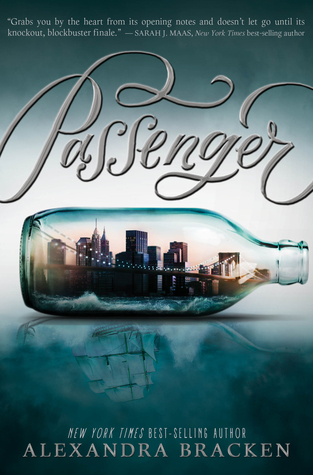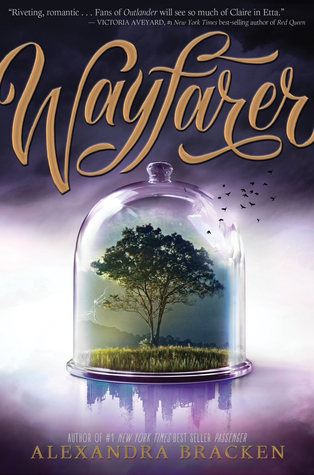"I would say it's a pleasure to meet thee, Prosperity Oceanus Redding, but truly, I only anticipate the delights of destroying thy happiness."
Prosper is the only unexceptional Redding in his old and storied family history — that is, until he discovers the demon living inside him. Turns out Prosper's great-great-great-great-great-something grandfather made — and then broke — a contract with a malefactor, a demon who exchanges fortune for eternal servitude. And, weirdly enough, four-thousand-year-old Alastor isn't exactly the forgiving type.
The fiend has reawakened with one purpose — to destroy the family whose success he ensured and who then betrayed him. With only days to break the curse and banish Alastor back to the demon realm, Prosper is playing unwilling host to the fiend, who delights in tormenting him with nasty insults and constant attempts trick him into a contract. Yeah, Prosper will take his future without a side of eternal servitude, thanks.
Little does Prosper know, the malefactor's control over his body grows stronger with each passing night, and there's a lot Alastor isn't telling his dim-witted (but admittedly strong-willed) human host.
Passage, n.
i. A brief section of music composed of a series of notes and flourishes.
ii. A journey by water; a voyage.
iii. The transition from one place to another, across space and time.
In one devastating night, violin prodigy Etta Spencer loses everything she knows and loves. Thrust into an unfamiliar world by a stranger with a dangerous agenda, Etta is certain of only one thing: she has traveled not just miles but years from home. And she’s inherited a legacy she knows nothing about from a family whose existence she’s never heard of. Until now.
Nicholas Carter is content with his life at sea, free from the Ironwoods—a powerful family in the colonies—and the servitude he’s known at their hands. But with the arrival of an unusual passenger on his ship comes the insistent pull of the past that he can’t escape and the family that won’t let him go so easily. Now the Ironwoods are searching for a stolen object of untold value, one they believe only Etta, Nicholas’ passenger, can find. In order to protect her, he must ensure she brings it back to them—whether she wants to or not.
Together, Etta and Nicholas embark on a perilous journey across centuries and continents, piecing together clues left behind by the traveler who will do anything to keep the object out of the Ironwoods’ grasp. But as they get closer to the truth of their search, and the deadly game the Ironwoods are playing, treacherous forces threaten to separate Etta not only from Nicholas but from her path home... forever.
All Etta Spencer wanted was to make her violin debut when she was thrust into a treacherous world where the struggle for power could alter history. After losing the one thing that would have allowed her to protect the Timeline, and the one person worth fighting for, Etta awakens alone in an unknown place and time, exposed to the threat of the two groups who would rather see her dead than succeed. When help arrives, it comes from the last person Etta ever expected—Julian Ironwood, the Grand Master’s heir who has long been presumed dead, and whose dangerous alliance with a man from Etta’s past could put them both at risk.
Meanwhile, Nicholas and Sophia are racing through time in order to locate Etta and the missing astrolabe with Ironwood travelers hot on their trail. They cross paths with a mercenary-for-hire, a cheeky girl named Li Min who quickly develops a flirtation with Sophia. But as the three of them attempt to evade their pursuers, Nicholas soon realizes that one of his companions may have ulterior motives.
As Etta and Nicholas fight to make their way back to one another, from Imperial Russia to the Vatican catacombs, time is rapidly shifting and changing into something unrecognizable… and might just run out on both of them.
According to your website bio, Star Wars offered a significant spark of imagination for you growing up. What about the story resonates most with you?
My dad was a collector of Star Wars memorabilia from the time I was in first grade until he passed away in 2012, so I spent so much of my childhood and teenage years going to conventions, reading all of the tie-in novels, and rewatching all of the movies. It was, shall we say, a not-so-casual obsession--I made sure to memorize all of the answers to Star Wars Trivial Pursuit so no one would ever be able to beat me. So I think, in many ways, I ended up absorbing an understanding about storytelling, specifically how the traditional Hero's Journey is framed and how archetypes play into it, just by being constantly surrounded by that universe.
What I've always loved best about Star Wars is its cast of characters. The films taught me from a young age that audiences and readers will follow a story anywhere if they love the characters--something I keep in mind while working on my own stories. If a character's motivations aren't strong enough, or if they're not interesting enough, it can sink a whole story. Luke's journey in particular is deeply moving to me because it's such a big arc, and I'm so curious about where they're going to take him next. I framed the narrative of my A New Hope retelling, The Princess, the Scoundrel, and the Farm Boy, to be split between Han, Luke, and Leia's point of views so I could dig in deep to who they are as people and really explore their motivations, their hopes, and their fears.
Those are the kinds of invisible internal forces that really drive a story forward--and add extra meaning to what happens. In addition, THE DREADFUL TALE OF PROSPER REDDING explores inner demons and sadness. What, in your opinion, is the key to happiness, and why?
One of the really interesting things about writing is that you sometimes don't actually understand what your story is about until you have a finished draft of it. That was very much the case with this book--I set out to write the kind of darkly humorous book I would have loved at Prosper's age, only to realize that its emotional core is largely centered on the doubts and fears that inwardly plague us. Alastor is that ugly voice inside of our head telling us that we can't do it, that we're stupid for wanting, that something is never going to happen, that we're not good enough--times, like, a hundred.
I'm not sure there's any one key to happiness, but I've definitely figured out a few things over the last few years. For me, the key to happiness has been finding ways to express love. It's telling others how much you appreciate them, it's taking a moment to stop and be grateful for the things you have, it's taking care of another person who needs help, it's finding a hobby to sink your enthusiastic energy into and enjoy, and so on.
Excellent advice. I love the premise of both PASSENGER and WAYFARER, and you have a real talent with voice. Do characters come to you fully fleshed or do they develop as you write them? Or both?
Thank you so much! I usually can't start a story until I have a good grasp of the main characters. I tend to hear their voices in my head before I develop a sense of what they look like, actually. Passenger and Wayfarer were a challenge for a number of reasons, not the least of which being that I had to find ways to differentiate the two close third person narrative voices. Etta is a modern teen, so her chapters tend to be a lot more relaxed in terms of language. Nicholas, however, is a young man of the 18th century. He has a more formal way of expressing himself verbally and in his own thoughts. If I used an anachronistic word or expression in his section (and believe me, I was constantly checking the Oxford English Dictionary to see if words were in use in the 18th century,or if their meaning had changed since his time period), it was 1) because I thought the meaning wouldn't be clear to the reader otherwise or 2) I thought he could figure out the meaning based on context, or had encountered it in his time travel.
I'm working on a new project right now and developing out the characters--really getting to know them inside and out. It's crucial that I take the time to do this before I sit down to start writing, because it also helps me locate the emotional center of the book. Sometimes I get really lucky and the characters come fully formed in one big rush (which happened with The Darkest Minds), but, most of the time, I have to sit down with a notebook and suss out their motivations and backstories. They do sometimes surprise me while I'm in the middle of drafting, though!
I'll bet they do! And that's great advice for character development. THE DARKEST MINDS also explores the strains between ability and control. What do you hope readers can gain from Ruby's story?
I really wanted Ruby to have a big arc over the course of the trilogy. Despite her incredible ability, she starts in a position of powerlessness because she doesn't know how to control said ability and is essentially a prisoner, both in the world and inside of her own mind. When it comes down to it, she's deeply traumatized and afraid, and, realistically, suffers setbacks in her confidence and slips in her moral code along the way. But her story is one of her first accepting herself, then learning how to master the potential of her innate power, and, finally, harnessing it to change the world around her--something that we can all do, even if we don't have powers of the mind.
A great reminder for us all. What are some of your current projects?
I just finished the first draft of The Dreadful Tale of Prosper Redding's sequel (hooray!) and am waiting on those edits. I just wrote three not-so-short stories set in the world of The Darkest Minds for the new special editions we're releasing in January, too! But my main focus over the next few months is a new YA that I sadly cannot tell you anything about yet!
The Dreadful Tale of Prosper Redding:
Buy: BookPassage ~ Amazon.com ~ Barnes & Noble ~ IndieBound
Passenger series:
Buy: BookPassage ~ Amazon.com ~ Barnes & Noble ~ IndieBound
Buy: BookPassage ~ Amazon.com ~ Barnes & Noble ~ IndieBound
The Darkest Minds:
Buy: BookPassage ~ Amazon.com ~ Barnes & Noble ~ IndieBound
This post can also be viewed here.








No comments:
Post a Comment